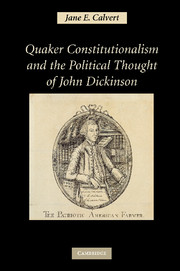Book contents
- Frontmatter
- Contents
- Acknowledgments
- Abbreviations
- Introduction
- I QUAKER CONSTITUTIONALISM IN THEORY AND PRACTICE, C. 1652–1763
- 1 Bureaucratic Libertines: The Origins of Quaker Constitutionalism and Civil Dissent
- 2 A Sacred Institution: The Quaker Theory of a Civil Constitution
- 3 “Dissenters in Our Own Country”: Constituting a Quaker Government in Pennsylvania
- 4 Civil Unity and “Seeds of Dissention” in the Golden Age of Quaker Theocracy
- 5 The Fruits of Quaker Dissent: Political Schism and the Rise of John Dickinson
- II THE POLITICAL QUAKERISM OF JOHN DICKINSON, 1763–1789
- Bibliography
- Index
- References
3 - “Dissenters in Our Own Country”: Constituting a Quaker Government in Pennsylvania
Published online by Cambridge University Press: 27 July 2009
- Frontmatter
- Contents
- Acknowledgments
- Abbreviations
- Introduction
- I QUAKER CONSTITUTIONALISM IN THEORY AND PRACTICE, C. 1652–1763
- 1 Bureaucratic Libertines: The Origins of Quaker Constitutionalism and Civil Dissent
- 2 A Sacred Institution: The Quaker Theory of a Civil Constitution
- 3 “Dissenters in Our Own Country”: Constituting a Quaker Government in Pennsylvania
- 4 Civil Unity and “Seeds of Dissention” in the Golden Age of Quaker Theocracy
- 5 The Fruits of Quaker Dissent: Political Schism and the Rise of John Dickinson
- II THE POLITICAL QUAKERISM OF JOHN DICKINSON, 1763–1789
- Bibliography
- Index
- References
Summary
The transition from political theory to practice in the Quaker colonies was a difficult one. The same problems plagued them in their early years as troubled the Quaker ecclesiastical polity at its founding. How would a people whose theologico-political thought was based on apparently irreconcilable tenets of unity and dissent, of bureaucracy and liberty, settle the question of authority amongst themselves? In the church, they had decided the issue in favor of a representative spiritual democracy with elders and ministers bearing most of the weight of legal discernment and governance. The balance in a civil polity, however, was not so easily achieved. The Quaker theory of a civil government, like their theology, suggested a strong popular element. But leading Friends were all too aware that the libertinism that necessitated a powerful central government in their church could surface in their new civil polities, West Jersey and Pennsylvania. Although Quakers could not agree at first on what balance should look like in these polities, they concurred on their other basic principles – that the polity was sacred and perpetual, and that change must be made within the existing framework and without violence. Unlike the church government, in the early years of these civil experiments, we see the balance of power shift from the elite few to the popular majority.
- Type
- Chapter
- Information
- Publisher: Cambridge University PressPrint publication year: 2008

